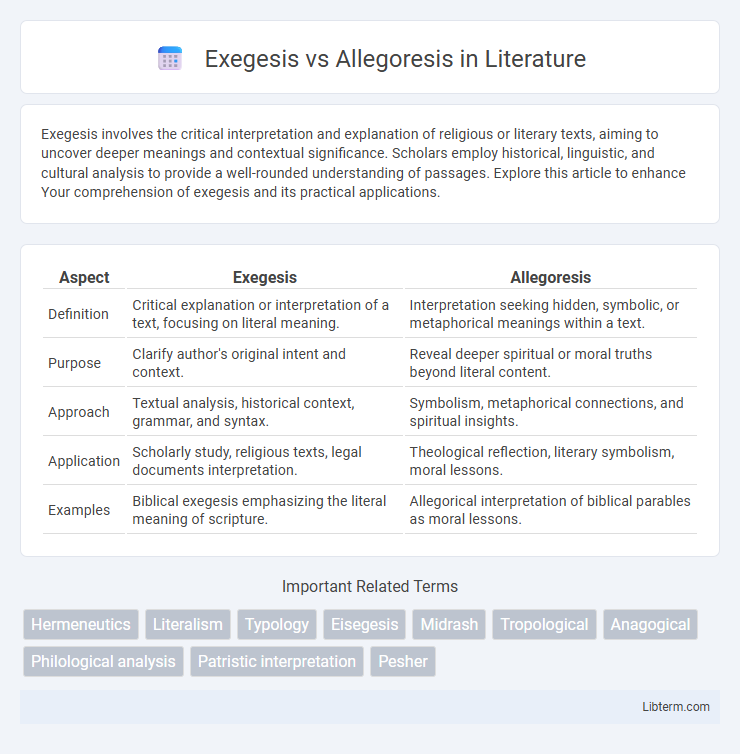Exegesis involves the critical interpretation and explanation of religious or literary texts, aiming to uncover deeper meanings and contextual significance. Scholars employ historical, linguistic, and cultural analysis to provide a well-rounded understanding of passages. Explore this article to enhance Your comprehension of exegesis and its practical applications.
Table of Comparison
| Aspect | Exegesis | Allegoresis |
|---|---|---|
| Definition | Critical explanation or interpretation of a text, focusing on literal meaning. | Interpretation seeking hidden, symbolic, or metaphorical meanings within a text. |
| Purpose | Clarify author's original intent and context. | Reveal deeper spiritual or moral truths beyond literal content. |
| Approach | Textual analysis, historical context, grammar, and syntax. | Symbolism, metaphorical connections, and spiritual insights. |
| Application | Scholarly study, religious texts, legal documents interpretation. | Theological reflection, literary symbolism, moral lessons. |
| Examples | Biblical exegesis emphasizing the literal meaning of scripture. | Allegorical interpretation of biblical parables as moral lessons. |
Introduction to Exegesis and Allegoresis
Exegesis involves the critical interpretation and explanation of a text, aiming to uncover its original meaning by analyzing linguistic, historical, and cultural contexts. Allegoresis interprets texts symbolically or metaphorically, often revealing deeper spiritual or moral meanings beyond the literal sense. Both methods shape theological study, with exegesis establishing foundational understanding and allegoresis expanding interpretative horizons.
Defining Exegesis: Meaning and Purpose
Exegesis is the critical interpretation and explanation of a text, specifically aiming to uncover its original meaning and context by analyzing linguistic, historical, and cultural factors. Its purpose is to provide an accurate understanding of the author's intended message, distinguishing it from allegoresis, which interprets texts symbolically or metaphorically. Exegesis helps scholars and readers grasp foundational meanings, supporting informed theological, literary, or historical analysis.
Understanding Allegoresis: Concept and Application
Allegoresis is the interpretative method that seeks hidden, symbolic meanings beneath the literal text, often utilized in religious and literary analysis to unveil deeper spiritual or moral truths. Unlike exegesis, which aims to clarify the original author's intent through historical and contextual understanding, allegoresis transcends literal meaning to explore philosophical or mystical dimensions. This approach is prominently applied in biblical hermeneutics, where scriptures are examined for allegorical significance that resonates with broader theological themes and ethical teachings.
Historical Development of Exegesis
Exegesis originated in ancient religious traditions as a methodical approach to interpreting sacred texts by analyzing linguistic, historical, and cultural contexts, with early Jewish and Christian scholars like Philo of Alexandria and Origen contributing to its formalization. Throughout the Middle Ages, scholastic theologians further refined exegesis by emphasizing literal and grammatical analysis, distinguishing it from allegoresis, which relied on symbolic and metaphorical interpretations. The Renaissance and Enlightenment periods saw exegesis evolve into a critical, historical discipline aimed at uncovering original meanings, laying the foundation for modern biblical scholarship.
Origins and Evolution of Allegoresis
Allegoresis originated in ancient philosophical and religious traditions, notably within Platonic thought, where texts were interpreted symbolically to reveal deeper truths beyond the literal meaning. This method evolved during the early Christian era as theologians like Origen adapted allegorical interpretation to reconcile scripture with emerging doctrinal beliefs. The evolution of allegoresis reflects a shift from purely literal exegesis towards a complex hermeneutic system that emphasizes spiritual and mystical dimensions in textual analysis.
Key Differences Between Exegesis and Allegoresis
Exegesis involves critical interpretation and explanation of a text's literal meaning, often based on historical and linguistic context, whereas allegoresis seeks deeper, symbolic, or spiritual meanings beyond the text's surface. Exegesis prioritizes authorial intent and factual accuracy, while allegoresis emphasizes metaphorical or typological significance that can apply to broader moral or theological themes. Key differences include exegesis's focus on objective analysis contrasted with allegoresis's interpretive flexibility and often subjective insights.
Methods and Techniques in Exegesis
Exegesis employs critical methods such as textual analysis, historical context evaluation, and linguistic study to interpret biblical texts accurately, ensuring the original meaning is preserved. Techniques include examining manuscript variants, analyzing grammar and syntax, and considering cultural and historical backgrounds to uncover the author's intent. These disciplined approaches contrast with allegoresis, which interprets scripture symbolically or metaphorically beyond the literal sense.
Approaches and Strategies in Allegoresis
Allegoresis employs symbolic interpretation strategies that seek hidden or spiritual meanings beyond the literal text, contrasting with exegesis's focus on grammatical, historical, and contextual analysis to uncover the original author's intent. Strategies in allegoresis include identifying metaphoric elements, interpreting narratives as moral or theological lessons, and emphasizing typology, where Old Testament events are seen as prefigurations of New Testament revelations. This approach often aligns with doctrinal frameworks, using imaginative and theological extrapolation to reveal layered, non-literal messages within biblical scriptures.
Impact on Biblical and Literary Interpretation
Exegesis enhances biblical and literary interpretation by grounding analysis in the original context, language, and intended meaning of the text, fostering accurate understanding and theological clarity. Allegoresis influences interpretation by uncovering symbolic or hidden meanings, allowing for broader theological or philosophical insights that transcend literal text boundaries. The impact on biblical studies is profound, as exegesis supports doctrinal precision while allegoresis encourages spiritual reflection and diverse hermeneutical approaches in literature.
Conclusion: Exegesis or Allegoresis—Which to Choose?
Exegesis offers a precise, text-focused approach crucial for accurate scriptural interpretation by emphasizing historical context and authorial intent. Allegoresis provides a more flexible, symbolic understanding beneficial for exploring deeper theological or moral meanings beyond the literal text. Choosing between exegesis and allegoresis depends on whether the goal is to uncover the original meaning or to derive broader spiritual insights.
Exegesis Infographic

 libterm.com
libterm.com